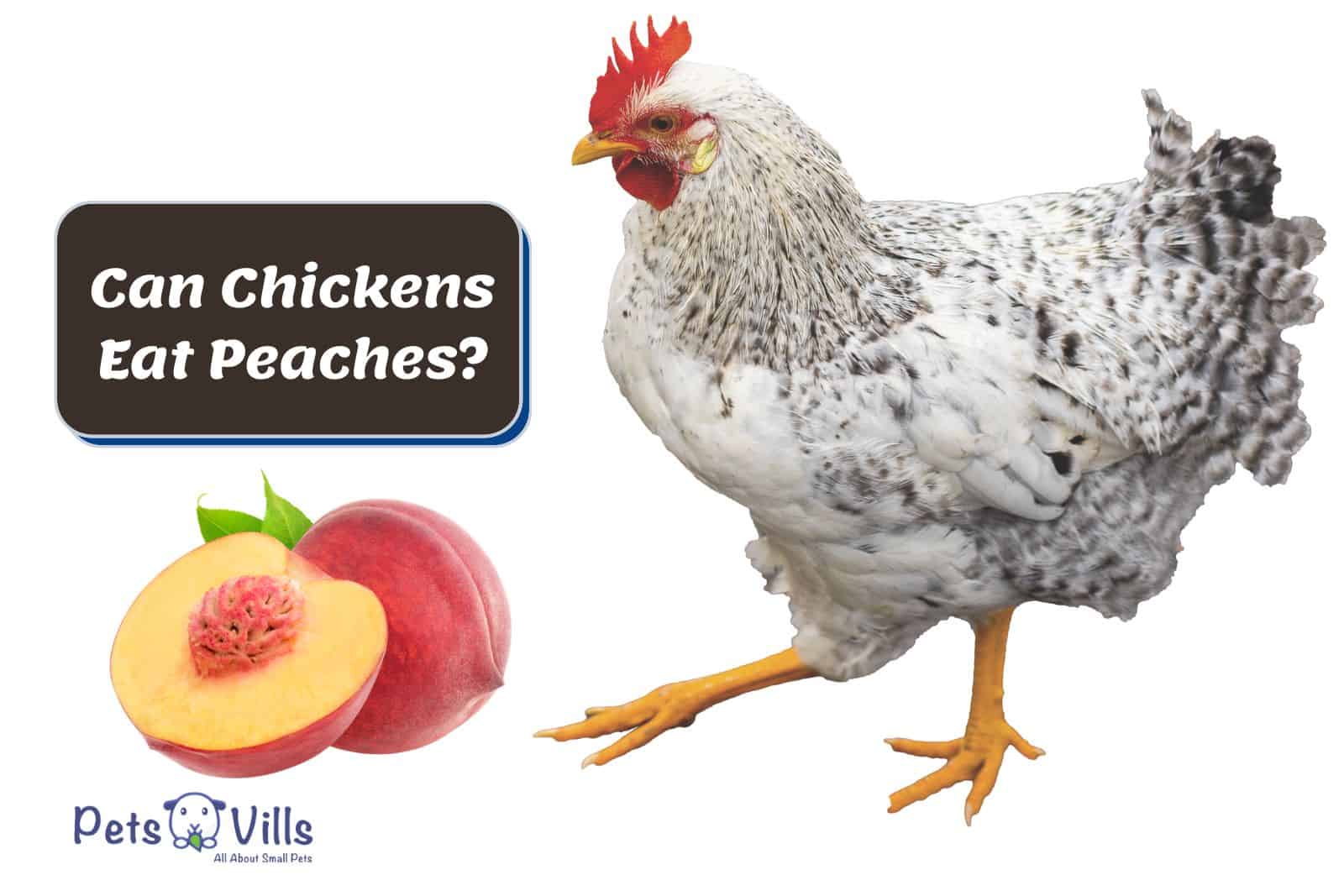Peaches are among my favorite summer fruits due to their delightful taste and highly nutritious makeup. But I often wonder whether my flock can share in my enjoyment of this fruit.
So can chickens eat peaches? Experts say they can eat peaches, but only the flesh, as the seed/pit contains poisonous cyanide (1).
But is this small risk worth feeding your chickens peaches?
Read on, and I’ll help you determine whether peaches suit your chickens.
Table of Contents
Key Takeaways
- Peaches are a sweet treat that’s a beneficial source of nutrients for chickens. But the seeds and pit need removal as they cause cyanide poisoning in larger amounts.
- A long list of benefits comes from feeding your chicken peaches. Some include offering high amounts of antioxidants, boosting immunity, and aiding digestive health.
- This nutritious treat should be separate from your chicken’s daily diet. Offering chickens peaches once weekly is a perfect amount for them.
Is It Safe For Chickens To Eat Peaches?
It’s safe for chickens to eat peaches. But as I mentioned, you’ll want to avoid the seed or pit before serving them to your flock.
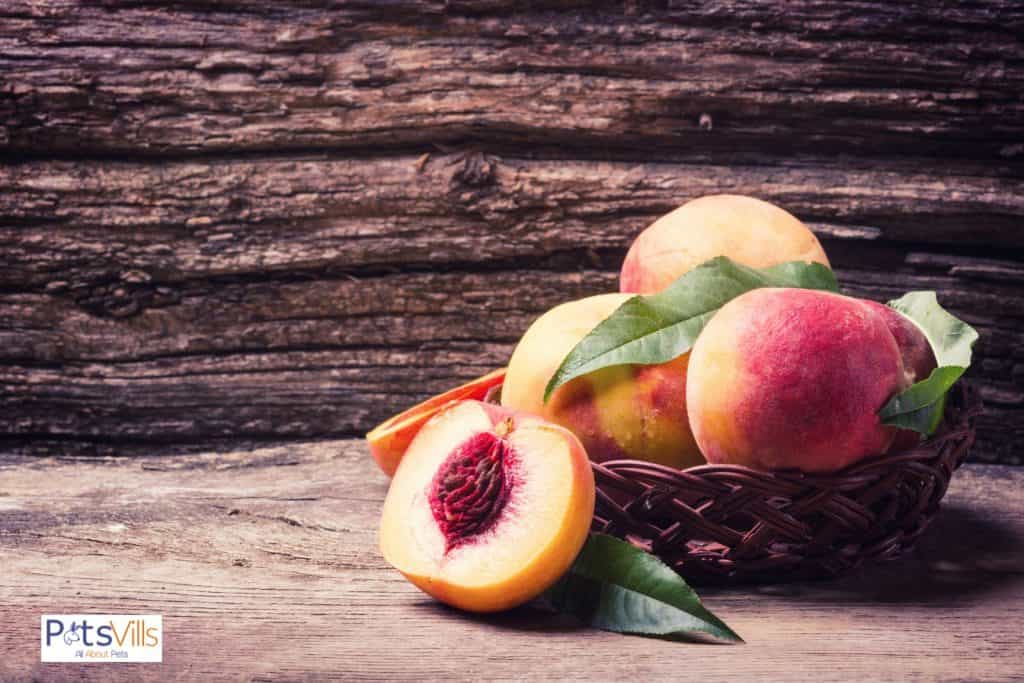
Peach pits and seeds are harmful to the chicken as they contain cyanide (2). It’s not detrimental to chickens in trace amounts but causes lethal cyanide poisoning in larger ones.
Be cautious by throwing away the seed before serving them. It’s just a simple way to avoid harm to our feathered friends.
Is It Healthy For Chickens To Eat Peaches?
Peaches are indeed a healthy treat for chickens. After all, these fruits offer high vitamin and mineral content.
So it shouldn’t be shocking to learn that peaches offer certain health benefits. Below, I’ll discuss some of them to ensure you know what these fruits provide.
#1 High in Antioxidants
One of the most notable attributes provided by peaches is being high in antioxidants. It’s a crucial aspect because antioxidants are vital to keeping chickens healthy.
For instance, they prevent free radicals from damaging the cells of chickens. No good comes from allowing free radicals to run rampant through a chicken’s body.
If too many free radicals are in the body, it’ll cause significant damage to the cells of chickens. As a result, your chickens will become sick and weak.
Feeding chickens peaches is an easy way to prevent them from being a nuisance. It’s why I often throw peaches into my flock’s diet when I’m worried about illness.
So if I notice a chicken is sick, I can feed the chicken peaches to help combat the spreading. It’s not an end-all solution, but it certainly helps.
#2 Boosts Immunity
Vitamin C is one area where peaches excel past most other food items. Plus, their high vitamin C content is essential for chickens.
It earns this title through vitamin C being able to help boost immunity. In other words, high amounts of vitamin C can help prevent your chickens from getting sick.
It’s another reason why peaches are effective against illnesses. High vitamin C foods can even help quicken the recovery process.
I’ve seen its impact firsthand with one of my chickens recently. He managed to get over a cold quicker than expected by offering him high-vitamin C foods like peaches.
#3 Aids the Digestive System and Prevents Digestive Issues
An often overlooked benefit of peaches is their ability to improve digestion. Honestly, it never hurts to have a rash of food items to help a chicken digest food better.
As for how peaches help, one medium-sized peach has about 2 grams of fiber. Half of it is soluble fiber, while the other half is insoluble.
Insoluble fiber makes the stool thicker and helps move foods through the digestive tract smoothly. Plus, it helps prevent constipation.
As for soluble fiber, it provides food for beneficial bacteria in their intestines. These bacteria produce short-chain fatty acids to feed the cells in the gut.
In short, peaches can benefit any chicken with stomach issues. Feeding them to one of my backyard chickens suffering from diarrhea certainly seemed to help.
Can Chickens Eat Peach Tree Leaves?
Peach tree leaves aren’t an edible food item for chickens. As with peach seeds, these leaves contain cyanide.
But again, flock owners shouldn’t freak out if their chickens eat a few leaves. It won’t affect their health.
The issues come into play when a large number of leaves are eaten. In this situation, it’ll become hazardous and even sometimes lethal for your chickens.
So the main idea here is to avoid feeding them leaves entirely. Therefore, you won’t ever have to worry about adverse side effects.
Can Chickens Eat Peach Skins?
Peach skins are an excellent addition to a chicken’s diet. In fact, peach skins are healthy for them.
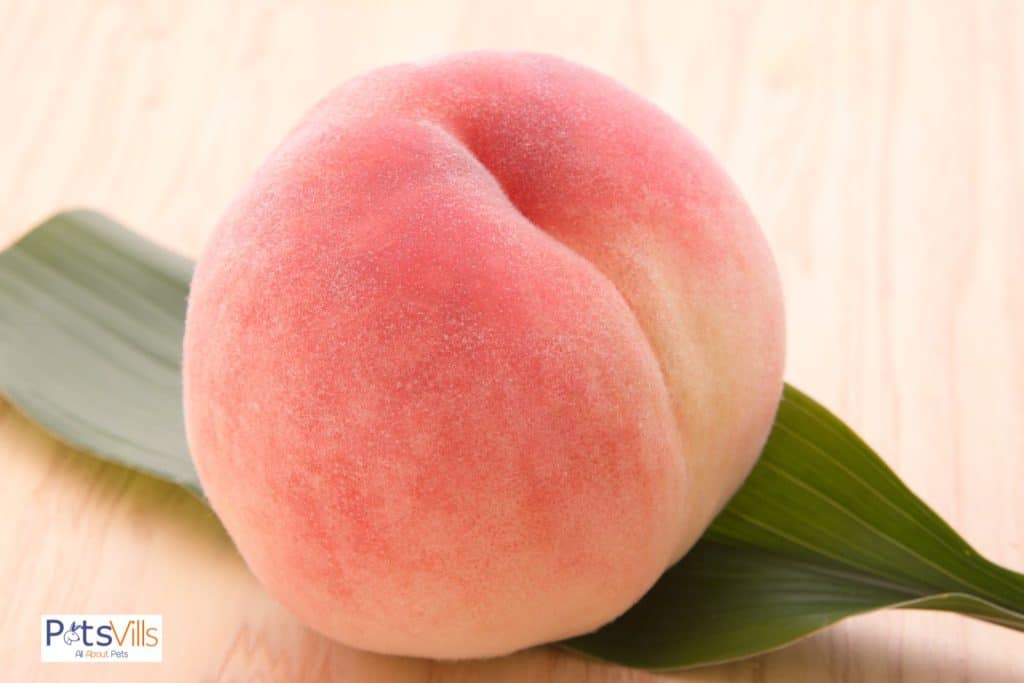
These valuable aspects come from beneficial nutrients found in the outer skin. I’d consider giving it to them, given its loaded nutritional value.
Moreover, feeding peach fruit skins to chickens couldn’t be simpler. You cut the peaches with the fuzzy skin attached and serve them.
Once eaten, your chickens will benefit from the nutrition of the peach fruit’s flesh and skin. So it’s a simple way to provide an additional nutritional boost for your flock.
Can Chickens Eat Canned Peaches?
Canned peaches are edible for chickens, but I wouldn’t recommend them. The issues come from canned peaches having preservatives added to them.
Manufacturers add these preservatives to ensure their quality for a long time. However, these add-ons are often “potassium sorbate and sodium benzoate” (3).
Sometimes, the preservatives could be citric acid, ascorbic acid, and salt. You can also expect them to add sizable amounts of sugar when to help preserve flavor.
None of these add-ons will do anything to help your chickens. On the contrary, all the preservatives and sugars can cause harm to the chickens.
So it’s much better to stick with fresh peaches when serving them to your flock. But small amounts of canned peaches won’t be harmful.
However, all those add-ons, like cyanide, become harmful in large doses.
How To Feed Peaches To Chickens
Feeding peaches to chickens can be done in a couple of ways. But I recommend one of the following three methods as I’ve found them most effective.
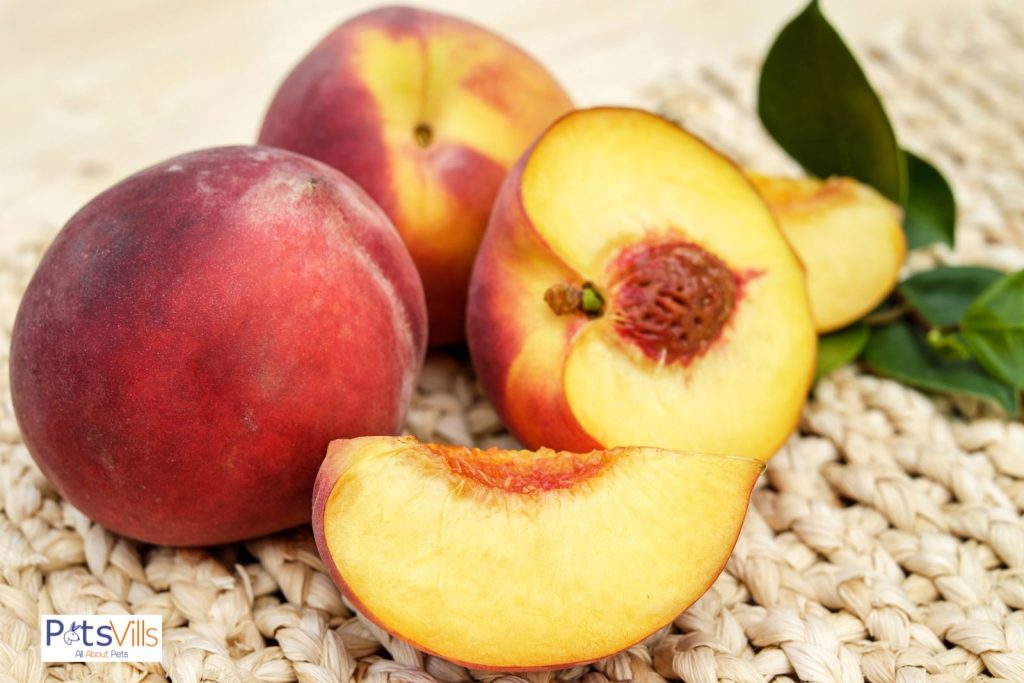
#1 Feeding Whole Peaches to the Chickens
Your first option would be feeding chickens whole peaches. Of course, the process starts by removing those pesky seeds from the fruits.
Some chickens may attempt to peck at the seeds if you don’t. It’ll only lead to them possibly getting chickens sick once inside it.
So it’s best to eradicate the problem. After removing the seed, I suggest tossing the peaches to your chickens.
The flock will devour them within seconds of entering their coop. Honestly, it’s always shocking how fast they manage to eat them.
#2 Hang the Peaches From a Branch
One of the more creative ways to use peaches is by hanging them from a branch. It represents a tether ball or leafy greens setup for your flock.
Due to this, it’ll help keep them active as your chickens will peak at it. It’s an easy way to provide additional exercise during the feeding process.
#3 Mixing Peaches with Chicken Feeds
I’ve always found adding extra nutrition to commercial chicken feeds helpful. One effective method for me is mixing in fruits like peaches.
It’ll provide the feed with all its nutritional benefits, including high vitamin C and dietary fiber. Plus, the mixing process is almost effortless.
It only requires cutting the peaches into small pieces. Once cut, mix them into the feeds to produce a nice solid nutrition-filled meal.
You can then place the mix next to your chickens. I imagine they’ll start devouring it immediately as our feathered friends immensely enjoy the taste of peaches.
For more poultry ponderings, check out the articles “Is Mango Safe for Chickens?”, “Can Chickens Have Pomegranate?” and “Can Chickens Eat Papaya Leaves?”.
How Much And How Often To Feed Peaches To Chickens
Moderation is a must with food items like peaches. It may sound a little weird considering their nutritious makeup, but it’s vital to keep your flock healthy.
You can point to two particular reasons for exercising moderation. For one, peaches aren’t a primary food source capable of offering daily nutrients for chickens.
So they’re much more effective as a tasty treat. In fact, feeding chickens too many peaches can cause a deficiency in their nutrition and health issues.
Instead, peaches and other fruits/veggies should be about 10% of their diet. The rest needs to come from a high-quality commercial feed.
These chicken feeds are formulated to provide your flock with proper nutrition. So it’s vital chicken owners trust them to meet those dietary requirements.
Given this info, I’d recommend supplying your chickens with peaches once weekly. This amount should give them all the wanted benefits while removing potential issues.
I’ve been doing it this way for a long time without causing issues for chickens. Therefore, I am confident that you will get the same results.
Other Fruits That Chickens Can Eat
Of course, peaches aren’t the only suitable fruit for chickens. Below I’ve gathered a list of my favorite alternative options.
If peaches aren’t meeting your needs, one of these options could help.
#1 Apple
Apples are first on my list due to their high nutrient content. Furthermore, it’s easy to find them, especially during the summer.
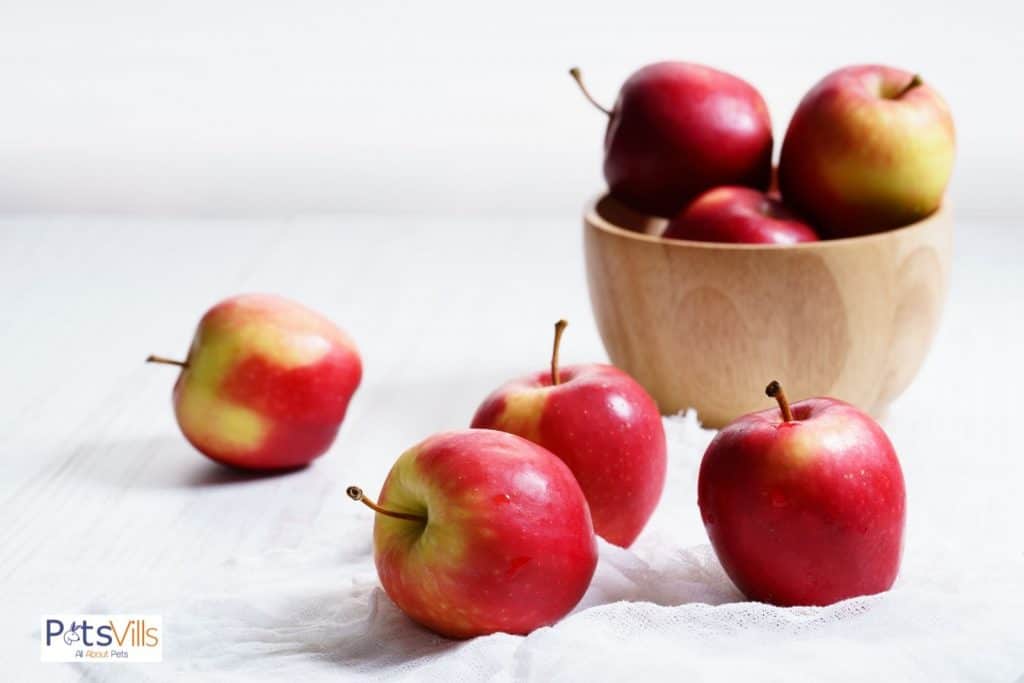
These fruits are also quite convenient when it comes to serving. Chickens can eat the entire fruit besides the apple seeds.
As with peaches, apple seeds contain small amounts of cyanide. So flock owners must carefully remove any apple seeds before tossing them into the chicken coop.
#2 Bananas
An unlikely addition to this list is bananas. However, poultry owners can rely on these fruits to provide an insane amount of nutrition.
Experts often recommend them to use as delicious treats for chickens. I’ve seen great results with how they’ve impacted my flock.
But bananas do offer one notable downside with their high natural sugar content. Therefore, minimizing their use is vital, much like you would with other sugary foods.
#3 Cranberries
Cranberries are an exciting fruit because they are only available in winter. But during these colder situations, cranberries can be beneficial.
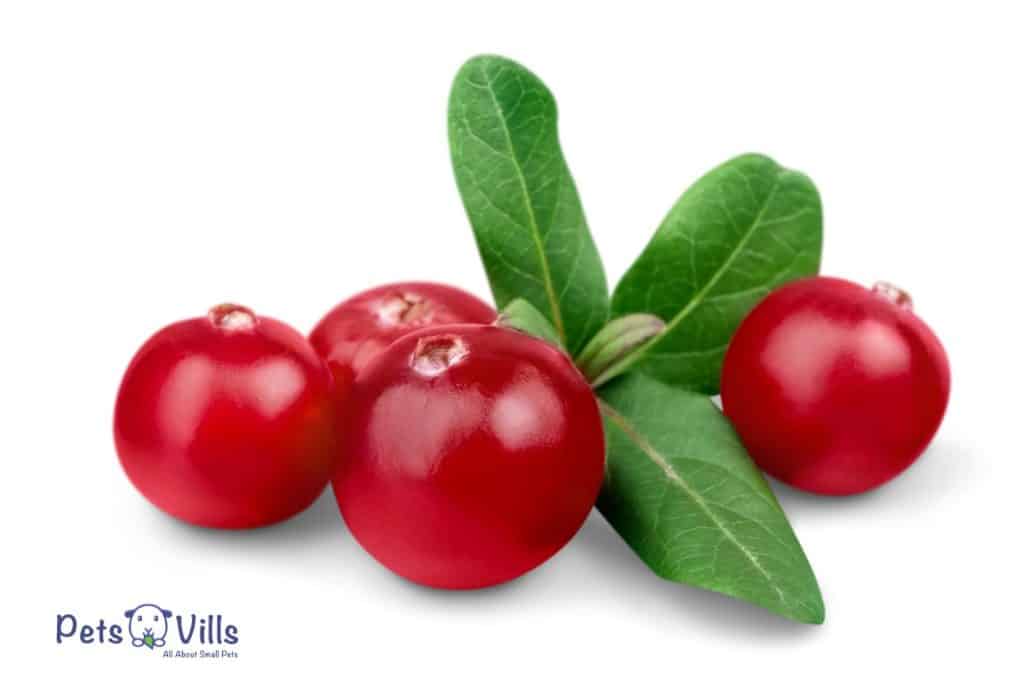
Their usefulness comes from being high in antioxidants and other nutrients. Plus, I enjoy their versatility since I can serve them fresh or frozen.
#4 Tomatoes
If you’re worried about a chicken’s lack of fiber, tomatoes are an excellent source. They’ll help with any digestive health issues like diarrhea or constipation.
I also love them as a reliable source of vitamins C, A, and B for various nutrients. The tomato plant is a well-balanced fruit for a chicken’s balanced diet.
Another benefit provided by tomatoes is their high water content. So it’s common for chicken owners to use them to keep chickens hydrated.
But please, make sure only to feed them ripe tomato fruit. Unripe tomatoes contain toxic alkaloid solanine, which can harm the chickens (4).
Find out if your chickens can safely enjoy the taste of jackfruit with our informative article on ‘Can Chickens Eat Jackfruit.’
FAQs
#1 Can chickens eat raw peaches?
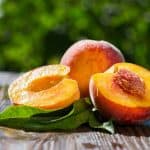
You can feed chickens raw peaches. But ensure you remove the pit and seeds before serving to prevent any adverse effects.
#2 What is the healthiest fruit for chickens?
The healthiest fruit for chickens is watermelon or blueberries. Both are considered incredibly healthy snacks capable of improving our feathered friends’ lives.
Conclusion
So can chickens eat peaches? Yes, peaches can be a nutritious snack for chickens when the seeds/pit are removed and prepared correctly.
If you met those requirements, it’d be a fun snack capable of providing excellent benefits. The peach fruit should be on the top of any poultry owner’s favorite treat list.
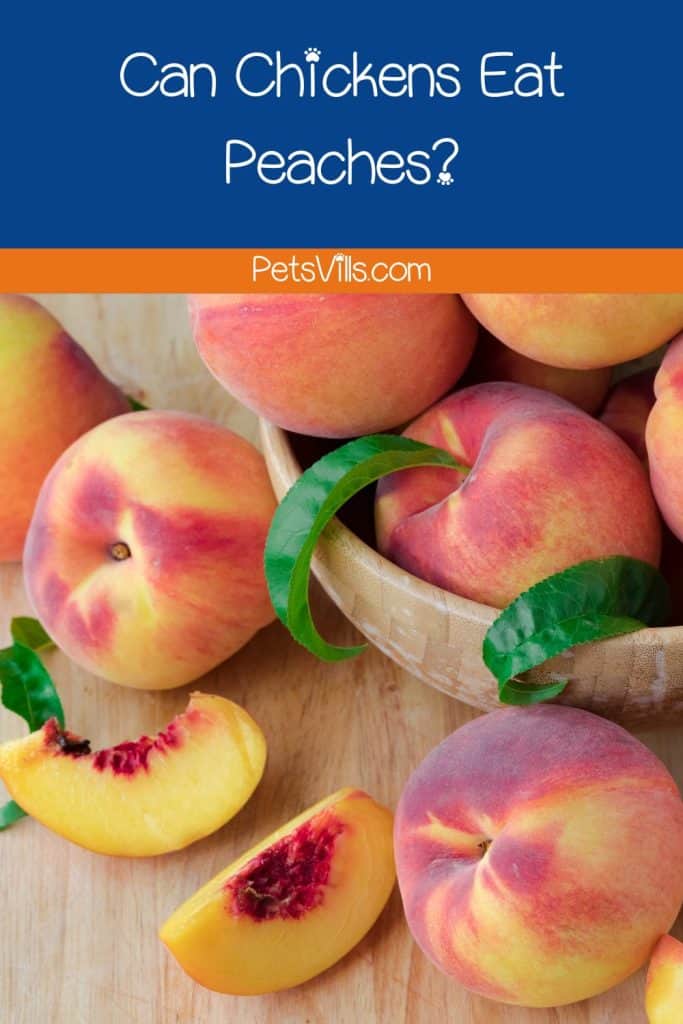
Resources
1. FoodData Central [Internet]. fdc.nal.usda.gov. Available from: https://fdc.nal.usda.gov/fdc-app.html
2. Holzbecher MD, Moss MA, Ellenberger HA. The Cyanide Content of Laetrile Preparations, Apricot, Peach and Apple Seeds. Journal of Toxicology: Clinical Toxicology. 1984;22:341–7.
3. BEUCHAT LR, HEATON EK. Sensory Qualities of Canned Peaches and Pears as Affected by Thermal Process, Sorbate and Benzoate. Journal of Food Protection. 1982;45:942–7.
4. Solanine – an overview | ScienceDirect Topics [Internet]. www.sciencedirect.com. [cited 2023 Feb 13]. Available from: https://www.sciencedirect.com/topics/medicine-and-dentistry/solanine
Grigorina grew up surrounded by animals – dogs, cats, cows, goats, sheep, and horses and that has shaped her into what I am today – a crazy cat lady who always has a place for one more cat (or a dog). She has two female cats – Kitty and Roni, and two tomcats – Blacky and Shaggy, but she also feeds her neighbors’ cats when they come for a visit. I just can’t say no to them. Follow her on FACEBOOK AND INSTAGRAM
Read her latest articles HERE
Learn more about her

